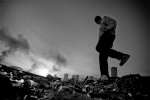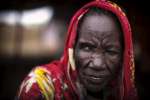UNHCR issues guidelines to counter discrimination, intolerance
News Stories, 22 December 2009
GENEVA, 22 December – The UN refugee agency has outlined a strategy for countering racism and xenophobia, which the organization says is a frequent cause of flight and which can threaten UNHCR's efforts to protect asylum seekers, refugees and the stateless.
"Xenophobia and racism are often at the root of discrimination and intolerance against asylum seekers and refugees," said Volker Türk, director of UNHCR's international protection division. "Many UNHCR offices have identified negative public attitudes towards persons of concern as a significant obstacle to the provision of international protection."
The guidelines state that fear of the 'other' typically underlies racist and intolerant sentiments. This fear has been compounded by the current global economic crisis and the deteriorating political and social environment in some countries. These factors pose additional challenges to the protection of people of concern to UNHCR.
The guidelines call for the monitoring of signs of intolerance such as racial discrimination and for tracking hate crimes. Underlying reasons for racial discrimination, xenophobia and intolerance – such as rising immigration or high unemployment -- must also be understood in order to develop effective counter-measures.
UNHCR must also assess whether intolerant attitudes are impacting its protection work, for example, by triggering restrictive policies that create new obstacles to asylum-seekers or a rise in hate crimes.
Changing intolerant attitudes is a task too great for one organization to achieve on its own. To successfully combat racism and xenophobia, the guidelines call for the engagement of a broad range of groups such as governments, law officers, UN bodies, non-governmental organizations and the media.
Affected communities must also be included in all stages of the process. Encouraging the involvement of potentially hostile communities can play a key role in conquering the 'fear of the other' underlying xenophobia. Support to individuals who are the victims of racism and intolerance must also be a priority.
"Racism, xenophobia and intolerance are serious threats to the protection of refugees, asylum-seekers and the stateless," said Türk. "UNHCR and its partners are working hard to tackle this challenge, but more needs to be done."



















































